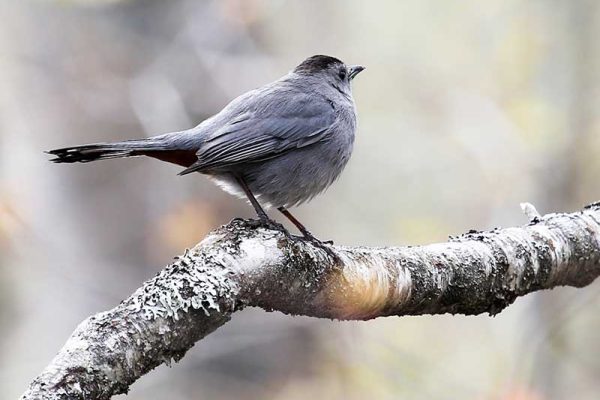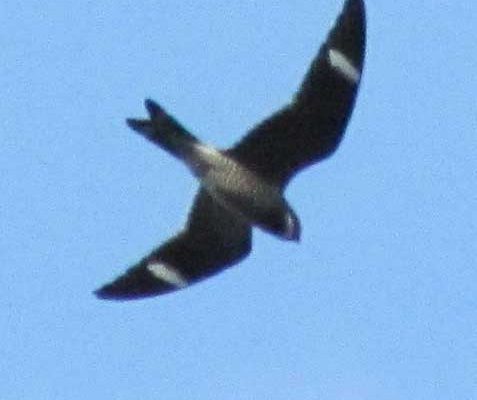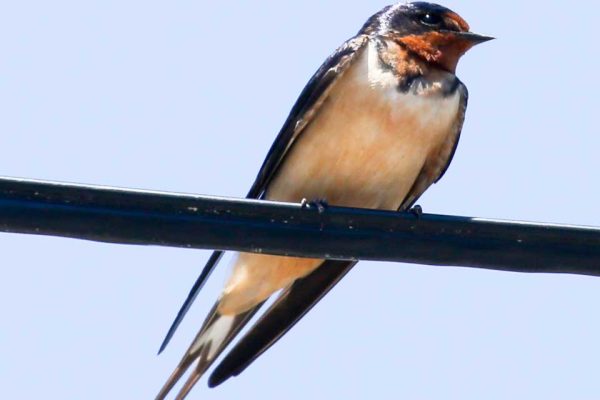With the gradual shift to cooler early evenings these August days, we’ve been enjoying sitting out on our porch, our dog happily sprawled out beside us, sniffing the air. We’ve been listening and scanning the powder-blue skies and the patchwork green of the lilac bushes, crabapple trees, maples, ashes, and other vegetation.

Gray Catbirds, a common Maine bird in the summer, will soon be gone from the state for the winter. (Photo by David Small)
Almost every night, we see the lilac tremble, and out from the middle of it comes our resident Gray Catbird. It starts with the yowling catlike cries, proving the bird is deserving its name. Eventually, if we wait awhile, it pops up on the top of a spindly sapling whose leafless tip extends above the shrubbery. The bird’s black cap and all-gray body is on display while it gives its loud, scratchy whine, giving the impression that it’s very annoyed.
We always eagerly await the sighting (and sound) of a catbird in our yard each May. Once the first arrives, they become a constant and well-enjoyed part of the summer scene. But as we move later into August, we can’t help but wonder wistfully if the one we’re hearing will be the last one of the season, Gray Catbirds being as they are—migrants that leave our area in winter. Some go as far south as the Caribbean, Central America, and even northern Colombia.

As species like catbirds leave, others, like Common Nighthawks, are passing through. (Photo by Jeff Wells)
It also often occurs to us around this time that we haven’t heard that familiar twitter from high in the sky above us that we had heard seemingly every moment over the last two months: the sounds of the so-called “flying cigars,” the Chimney Swifts. Have they left already, we wonder? We continue to scan the skies and sometimes we spot one silently overhead, its wings almost a blur. Just this week, we saw one. But will we see one tomorrow? Eventually, they will all have departed for South America until next May.
Those same evening skies that have held Chimney Swifts are now beginning to host another insect-eating traveler, one much, much bigger than the little swifts. Common Nighthawks pass through in August, migrating south from points north (some from as far north as Yukon and the Northwest Territories). They are a welcome sight, sleek with their falcon-like wings flashing a brilliant patch of white as they erratically swoop and tip through the air.
We’ve often noted that it seems as though Common Nighthawks’ southward migration coincides (at least in our area) with the seasonal appearance of flying ants—the time when ant colonies send out their sexually reproductive males and females to start new colonies. Massive numbers of males, in particular, emerge and become part of what is sometimes called “aerial plankton.” They and other insects that are flying or floating in the sea of air in which we live are consumed by aerial insectivores like swifts and nighthawks.

The authors saw a mixed flock of swallows a few weekends ago—they’ve probably migrated south for the winter now. (Barn Swallow, by David Small)
Swallows, too, are among the aerial insectivores that are starting to amass into flocks and depart our spaces for the season. We had been noticing that we weren’t seeing as many swallows around in the last few weeks. So we were thrilled to come across a flock of them perching on the roadside wires and foraging over the blueberry fields on Appleton Ridge a few weekends ago. Thirty or so Barn Swallows made up the bulk of the group but a swarthy, blocky-headed Cliff Swallow’s creaky calls gave it away. Then two tinier, almost dainty, brown-backed Bank Swallows buzzed in and sat on the wires. They are likely gone by now.
We watched all of these birds with deep appreciation, their bodies silhouetted against the deep blue sky of an August day in Maine. We were saying goodbye to them for the season. Maybe not today or tomorrow, but soon. And now we are saying “hello” to others—nighthawks, whimbrels, turnstones, and many more. The melancholy of change becomes the joy of new beginnings experienced through the birds around us.
—Jeff & Allison Wells
Banner photo: Appleton Ridge, by Allison Wells










I live on a pond in Central Maine. There have been so many Canadian Geese flying through in the last week or so. During the spring, it’s wonderful to hear them coming back. The summer evening brings floods of them back in the evening after they have gone somewhere to feast.
Then, suddenly, they disappear in Fall saying goodbye as they fly over going south. It’s bittersweet.
“Bittersweet” – yes, that’s a good way to put it. Thanks for sharing this memory – can totally relate to it!
Allison and Jeff